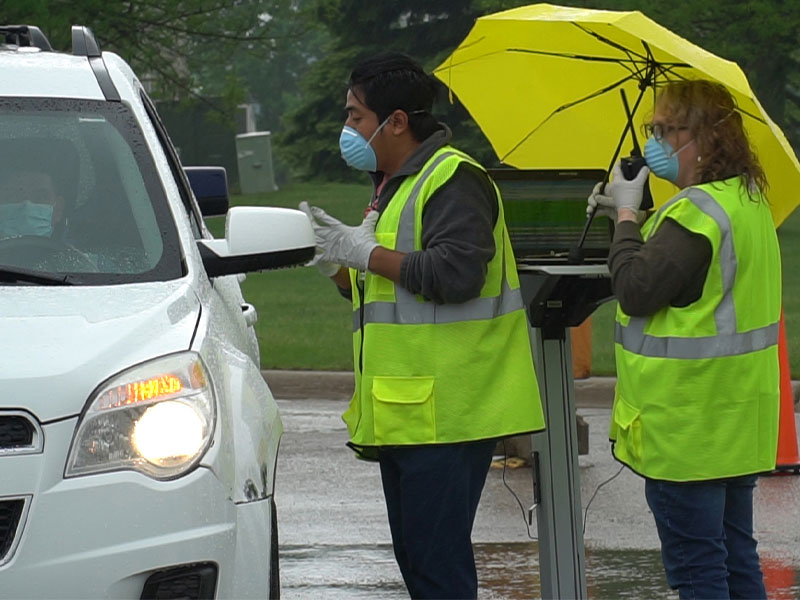For weeks, the small town of Worthington, Minnesota, watched as COVID-19 made its way from the coasts into the heartland.
Leaders at Sanford Worthington knew it was only a matter of time before the novel coronavirus appeared in their community, and worked to train and prepare staff.
What they didn’t know is that their small town would become one of the state’s largest outbreaks — and fast.
“You saw it on TV for so long, and were thinking, ‘Oh it’s never going to come.’ Then, from one day to the next it was just ‘bam.’ It’s here, and it’s really here,” said Sanford Health clinic supervisor Kylie Turner. “We couldn’t answer calls quick enough.”
Languages of Worthington
The town of 13,000 boasts diversity in both language and culture — points of pride for the city. Out of the 13,000 residents, 47.3% speak languages other than English. 33.7% of Worthington residents speak Spanish, and 9.5% speak Asian and Pacific Island languages, according to U.S. Census data.
Because of this, even before the COVID-19 pandemic, Sanford Health used contracted interpreters to talk with patients.
These interpreters talked face-to-face, over-the-phone, or online.
“We use interpreters regularly,” said Turner. “It’s really convenient. We can dial the phone number, the interpreter gets on with a patient with us, so we can resume the conversation with the aid of an interpreter. That communication is essential for building relationships with our patients.”
Turner says many area residents are not familiar with the United States health care system and its many complexities, which made communication all the more important amid the pandemic.
“It’s been important to spend time educating our patients and helping them understand,” said Turner. “There’s a lot of fear out there about COVID-19, and that’s compounded for patients who are confused or unsure about how and when to seek care. We’ve been working hard to answer questions and provide reassurance to our community.”
Help from within
Turner says when Worthington saw a large spike in cases, her team quickly realized they’d need extra help to communicate with patients.
Little did she know, that help would come from within.
Multiple Sanford Health employees, like Patty Valesco and Lorraine Ramirez, volunteered to become interpreters during the pandemic.
Valesco is a pharmacy technician, and Ramirez works in the health information management department.
Both are fluent in Spanish, and have lived in Worthington for a majority of their lives.
“I grew up around this area, and I grew up with an immigrant family. I can relate to our patients, and their families who are doing their best to understand, but need a little assistance communicating,” said Ramirez.
“I remember my parents needing a translator.”
For Valesco, the transition was easy, because she’s been translating since she was 10.
“My parents are Spanish speaking. I just grew up doing it and I know how much it’s needed. Growing up, I remember my parents taking us children to the doctor and having a difficulty communicating. So, I know how much it’s needed and I thought if I could help somebody else with that process, why not do it?” said Valesco.
Strength of Worthington community
While Worthington is a small town, Valesco says strangers helping strangers is a common occurrence in the Southwest Minnesota city.
“If you had a problem and you need to be able to communicate to get the help you need, and you can’t and there’s no interpreters to help you, how would you go about that?” said Valesco.
“In our town, everybody tries to help each other. There’s a lot of different languages, not just Spanish. There’s a lot of different ethnicities in this town, and as a community, we’ve been coming together to help each other.
“When we were conducting hundreds of COVID-19 tests a day, everybody was so nice, so polite. Everybody thanked us just for doing our job. Everybody was so grateful that we were there,” said Valesco.
The thanks and appreciation Ramirez received from the community is something she’ll remember forever.
“The translation services made so many people feel really comfortable. I remember hearing ‘gracias, muchas gracias,’ which means ‘thank you, thank you very much.’ I could remember their faces when they would say that. It was very touching because I relate to that and I was able to be a part of that.”
Learn more
…
Posted In COVID-19, People & Culture, Rural Health, Sanford Stories, Worthington

